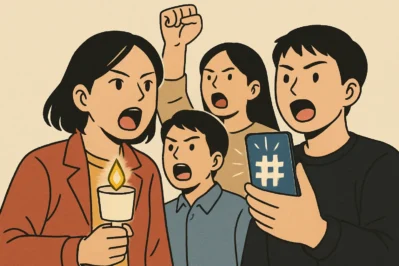Raise Your Voice: Mastering Korean for Civic Action
Hello! Welcome to [Maeil Hangul], your go-to blog for leveling up your Korean skills!
Today, we’re diving into a powerful and sophisticated topic: the language of social movements and civic engagement in Korea. Ever watched a Korean movie or drama about historical events, or seen news reports about passionate citizens advocating for change and wondered how to express those complex ideas? This lesson is for you. We’ll explore how to articulate arguments, show solidarity, and discuss the very strategies that have shaped modern Korean society.
Lately in Korea, there’s a growing conversation around climate action and corporate social responsibility, led by passionate young activists. Understanding the language they use will not only elevate your Korean to a near-native level but also give you a profound insight into the dynamic heart of Korean society. Let’s learn how to make our voices heard!
Core Expressions for Change-Makers
Here are some essential expressions you’ll encounter in discussions, news articles, and debates about social issues.
1. 목소리를 높이다 (moksori-reul nopida)
- Pronunciation: [mok-so-ri-reul no-pi-da]
- English Meaning: To raise one’s voice; to speak out more strongly; to make one’s opinion heard.
- Detailed Explanation: This is a crucial idiomatic expression. It’s not just about speaking loudly; it signifies strengthening one’s stance or argument on a particular issue, often in a public context. While 목소리를 내다 (moksori-reul naeda) means “to voice an opinion,” 목소리를 높이다 implies an escalation—making that opinion louder, more assertive, and more public in response to a situation. It’s frequently used in journalistic and formal contexts.
2. -에 뜻을 같이하다 (e tteus-eul gachi-hada)
- Pronunciation: [e tteu-seul ga-chi-ha-da]
- English Meaning: To be of the same mind about; to share the same will/purpose in…
- Detailed Explanation: This sophisticated phrase expresses deep agreement and solidarity. 뜻 means ‘will,’ ‘intention,’ or ‘purpose.’ 같이하다 means ‘to do together.’ So, you are literally “doing the purpose together.” It’s much stronger than simply ‘agreeing’ (동의하다). It implies a shared commitment to a cause or goal. You’ll often see it used when different groups form a coalition or when individuals join a movement.
3. 시민 불복종 (simin bulbokjong)
- Pronunciation: [si-min bul-bok-jjong]
- English Meaning: Civil disobedience.
- Detailed Explanation: This is a direct, high-level term for the concept of civil disobedience—the refusal to comply with certain laws or to pay taxes and fines, as a peaceful form of political protest. It’s a key term in political science and history and is used in academic papers, news analysis, and serious discussions about protest strategies. Using this term correctly demonstrates a very advanced command of the language.
4. -을/를 촉구하다 (eul/reul chokgu-hada)
- Pronunciation: [eul/reul chok-ggu-ha-da]
- English Meaning: To urge; to press for; to demand.
- Detailed Explanation: 촉구하다 is a formal verb used to strongly and publicly urge a government, company, or other entity to take a specific action. It carries more weight and urgency than ‘요구하다’ (to request/demand). You will almost always see this word in official statements from activist groups, newspaper headlines, and formal speeches. For example, “정부는 즉각적인 대책 마련을 촉구한다” (We urge the government to prepare immediate countermeasures).
Example Dialogue
Two university students, Minjun and Sora, are discussing a campus campaign after watching a documentary about plastic pollution.
A (Minjun): 소라야, 어제 본 환경 다큐멘터리 때문에 생각이 많아졌어. 우리 학교도 일회용품 사용을 줄여야 하지 않을까?
Sora, I’ve been thinking a lot since we watched that environmental documentary yesterday. Don’t you think our university needs to reduce its use of single-use products?
B (Sora): 완전 동감이야. 이미 몇몇 환경 동아리에서 목소리를 높이고 있더라. 우리도 그 캠페인에 뜻을 같이하는 게 어때?
I completely agree. I heard a few environmental clubs are already raising their voices about it. Why don’t we join them in their cause?
A (Minjun): 좋아! 총장님께 정책 변화를 촉구하는 서명 운동을 시작하는 거야. 이것도 일종의 평화적인 시민 불복종 활동이라고 할 수 있겠지.
Great idea! We can start a petition urging the university president to change the policy. I guess you could call this a peaceful act of civil disobedience in a way.
B (Sora): 맞아. 작은 실천이 모여서 큰 변화를 만드는 거니까. 내일부터 당장 시작하자!
Exactly. Small actions come together to create big change. Let’s start tomorrow!
Culture Tip: From Candlelight to Hashtags
Korea has a powerful history of civic engagement. You may have heard of the 촛불집회 (chotbul-jiphoe), or candlelight vigils. These massive, peaceful gatherings have become a symbol of Korean democracy, where millions of people have gathered to 목소리를 높이다 on major political issues.
This spirit of collective action is still very much alive today, but the tactics have evolved. While physical protests remain important, much of the modern social movement happens online. Hashtag campaigns on social media (like #기후위기비상행동 – #ClimateCrisisEmergencyAction) and online petitions are powerful tools. Understanding expressions like 뜻을 같이하다 and 촉구하다 helps you grasp the language used in these digital spaces, where citizens rally for change. Knowing this context shows you’re not just a speaker of Korean, but a true connoisseur of its living culture.
Let’s Practice!
Ready to put your knowledge to the test?
- Fill in the blank with the most appropriate expression from today’s lesson.
시민 단체들은 정부에 투명한 정보 공개를 강력히 _________.
(Civic groups are strongly _________ the government to disclose information transparently.) -
Using -에 뜻을 같이하다, write a short sentence about a cause or group you would support. (e.g., 저는 동물 보호 운동에 뜻을 같이하고 싶어요. – I want to join the cause of the animal rights movement.)
You’ve learned some incredibly powerful and sophisticated expressions today. Using them will allow you to engage in deep, meaningful conversations about Korean society.
Now it’s your turn! Leave a comment below answering the practice questions or creating your own sentence. Keep raising your voice and your Korean skills!






